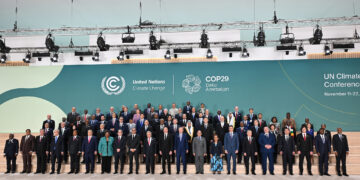Over 40 ministers convened during the COP28 Multilevel Action, Urbanization, Built Environment, and Transport Day in Dubai, revealing groundbreaking initiatives in collaboration with the United Nations Human Settlements Programme (UN-Habitat) and the UN Climate Change High-Level Champion for COP28. These initiatives, spanning buildings, waste, transport, water, and nature, reinforce the commitment to driving climate action in cities and fostering sustainable urban development.
The announcements made during the Urban Climate Ministerial included breakthrough initiatives like the ‘Cement and Concrete Breakthrough’ and ‘Buildings Breakthrough.’ These initiatives, part of the broader suite from COP26 and COP27, aim to mobilize governments to finance critical solutions for healthier, more sustainable, and equitable human settlements.
Key Announcements:
- Cement and Concrete Breakthrough:
- Launched by Canada and the UAE, endorsed by the United Kingdom, Ireland, Japan, and Germany.
- Aims to make clean cement the preferred choice globally by establishing near-zero emission cement production in every region by 2030.
- Buildings Breakthrough:
- Supported by 27 countries, led by France and Morocco.
- Aims to make ‘near-zero and resilient buildings’ the norm by 2030, addressing the building sector’s significant impact on global CO2 emissions, extracted materials, and waste.
- Waste to Zero Initiative:
- A voluntary coalition to decarbonize the waste management sector and transform waste into resources.
- Spearheaded by the UAE Ministry of Climate Change and Environment, Abu Dhabi Waste Management Company, and Roland Berger.
- Waste MAP:
- The first-ever global platform using satellite monitoring to track and measure methane emissions from waste.
- Developed by the Global Methane Hub, Google Foundation, Rocky Mountain Institute, Clean Air Taskforce, Netherlands Institute for Space Research, and Carbon Mapper.
- 15-Minute City Programs:
- C40, a network of nearly 100 mayors, accelerating the adoption of 15-minute City (15MC) policies.
- The Green and Thriving Neighborhoods program providing support for concrete pilot projects.
- Launch of the Healthy Neighborhoods Explorer tool to measure the impacts of 15MC on emissions and public health.
- Generation Restoration Project:
- Guided by the Paris Agreement and the Global Biodiversity Framework.
- Supporting pilot projects for urban ecosystem restoration and emissions mitigation in eight world cities.
- Fossil Fuel-Free Land Transport Commitments:
- The first-ever transport-energy ministerial at a COP, organized by the COP28 Presidency, the UAE Ministry of Energy and Infrastructure, the International Transport Forum, and the International Energy Agency.
- Call to action to double the share of energy-efficient and fossil-free forms of land transport by 2030.
- A Playbook for Nature-Positive Infrastructure Development:
- In partnership with the World Wildlife Fund (WWF) and the International Federation of Consulting Engineers (FIDIC).
- Spotlighting the construction sector’s role in conserving and restoring natural ecosystems.
- Greening Construction with Sustainable Wood Initiative:
- Forest & Climate Leaders’ Partnership’s (FCLP) initiative to unlock intergovernmental and multi-level collaboration.
- A framework for national governments and stakeholders to rapidly transform the building sector for greater mitigation, adaptation, and resilience.
These announcements follow commitments made during the Local Climate Action Summit (LCAS) at the beginning of COP28, where more than 60 countries launched the Coalition for High Ambition Multilevel Partnerships for Climate Action (CHAMP) initiative, pledging nearly USD $500 million in climate finance for urban infrastructure.
COP28 President Dr. Sultan Al Jaber emphasized the crucial role of mayors and governors in achieving the aims of the Paris Agreement, recognizing their leadership and support in addressing climate change. The initiatives underscore a collective commitment to fostering resilient, sustainable, and equitable cities worldwide. The outcomes of Multilevel Action, Urbanization, Built Environment, and Transport Day signal a proactive approach to urban climate action and set the stage for impactful transformations in city landscapes globally.





